#queer theory and trek
Text
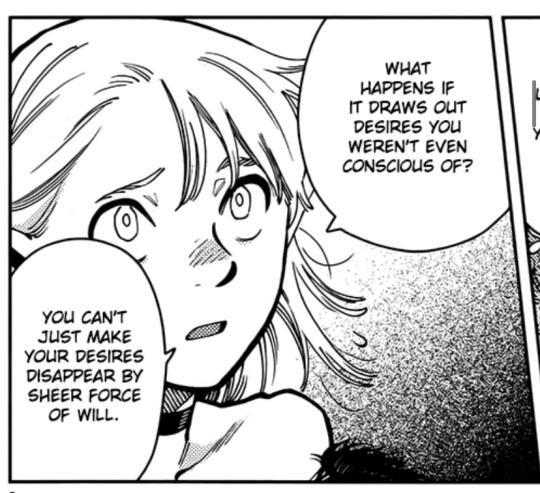
wait..... hold on
#punching and screaming and murdering#dunmeshi#dungeon meshi#i love queer theory videos analyisising shit like star trek and bearstars
148 notes
·
View notes
Video
youtube
#spirk#star trek#Star Trek: The Original Series#star trek TOS#kirk/spock#star trek iii: the search for spock#star trek: the motion picture#TMP#the search for spock#video essay#star trek video essay#gay#lgbtq+#lgbtq#queer#queer theory#subtext
44 notes
·
View notes
Text
if i had magic powers, one of the pettiest things i’d like to use them for is swap around what media has hellish discourse so nothing i like has it
#personal crap#it'd be fun (for me as a non-trekkie) to put all the hellish star wars discourse in star trek#or make everyone who gets mad at sp get mad at koth instead bc i hate that show#or make all the people who got mad about su get mad about something else instead#speaking of that last one i saw a vid doubleca5t just did where they said they've just finished watching it#and basically came out going 'really? there was that much discourse over that?' and i couldn't agree more#tbh my theory is that it came at a time when a) kid's cartoons were really mainstream so more people saw it than (say) spop or toh#and b) it had a lot of unapologetic lgbtq rep and young queer and female fans (who did toxic stuff admittedly)#which got it labelled 'an sjw show' by chodes and then people got embarrassed about that and decided it must be Bad actually#basically to validate trump supporters and other dickheads calling them cringe which. what
6 notes
·
View notes
Text
I think I might have figured out what the Mind Flayer really is.
This theory has been percolating in my brain for a while now; it hasn't really finished baking yet but I wanted to get the gist of it down before The First Shadow debuts.
Let’s begin at the Hawkins National Lab, 6th November 1983. For the second time in her young life, El faces terrifying and deeply traumatic circumstances which cause her powers to lash out and rip a gash in the fabric of reality.
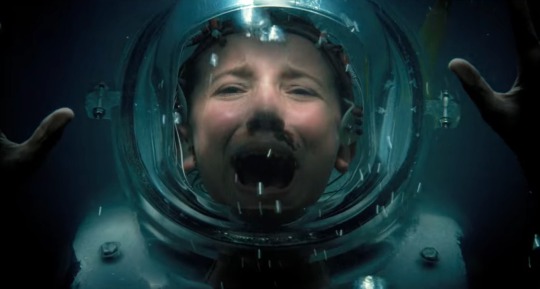
Meanwhile, across town, Will is doing what every queer 12 year-old has done and finds an excuse to spend an extra moment alone with his crush.
His little gay heart is as aflutter as the garage lights.
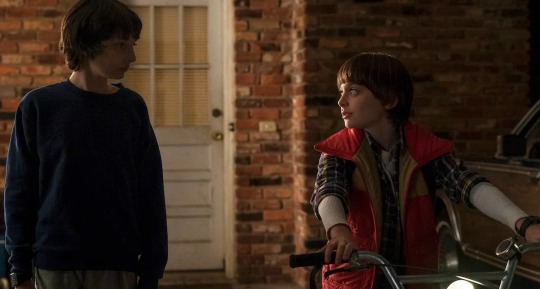
(Strange, that. The lights, I mean -- considering that he's on the other side of town from the lab. Do you suppose the Demogorgon trekked all the way to Mike's house and quietly followed him home again?)
Will heads home, lost in thought as he cycles past the lab. Is he thinking about how sweet his new X-Men #134 is gonna be? Or is he thinking about something even sweeter? The lights flutter again.
And something in front of him notices.
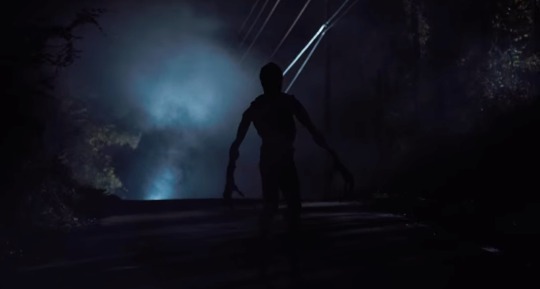
Will has always been noticeable: his clothes, his mannerisms, his interests -- they've always attracted the attentions of bullies. Now something new -- or maybe something that was always there and is only now making itself known -- has attracted the attentions of a monster.
He runs home, he calls for help, but he's alone, there's no escape. He races to the shed and loads a gun like his father taught him -- but it's not in his nature to be violent. He freezes, petrified.
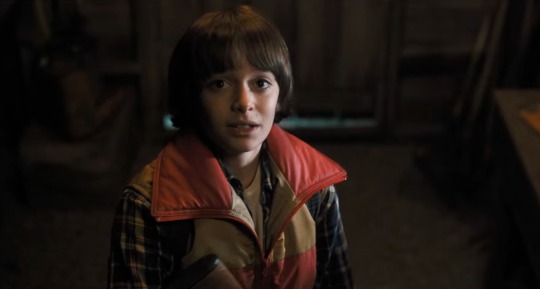
The lights surge as his terror wrestles control of his powers and uses them to puncture an escape route in the fabric of reality.
Why were we so quick to believe that the Demogorgon -- a minion of the guy whose whole thing is his inability to open gates -- was able to open its own temporary portals in S1 and then never again?
Will could plausibly have been responsible for every temporary portal in S1: he’s at the Byers house when the Demogorgon pushes through its walls; he's on the run to Castle Byers when Nancy stumbles across that portal in the woods; and he's plugged in to one of Vecna's vines during the finale -- something we see Vecna plug himself into when he remotely opens gates in S4.
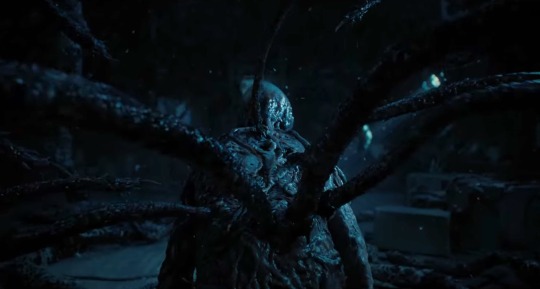
There’s one exception though.
Barb likely slipped through a gate in Steve's pool, but how could Will have opened that one when he was in his bedroom at the time, talking to his mother through the lights?
Let me ask you this: isn't it interesting that of all the injuries Barb could have obtained in her passage to the Upside Down, she got a nosebleed?
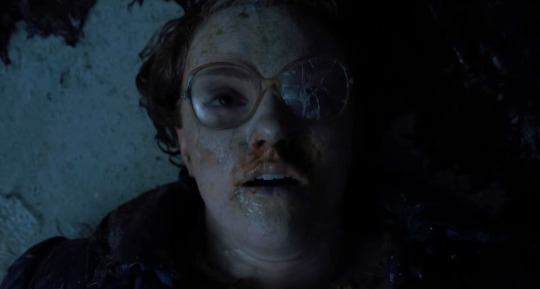
I think powers are more common than we’ve been led to believe, and gates are a last-ditch self-defense mechanism for anyone with powers.
This is why the four curse victims’ deaths opened a gate: Vecna pushed them to their breaking point to artificially trigger the self-defense response. Those headaches and nosebleeds weren't caused by Vecna directly, but by their own powers acting up as they inched towards oblivion.
[Shoutout to @givehimthemedicine's underrated powers and blood theory for the idea of Vecna's Curse being the overcharging of his victims' own powers.]
It was already pretty obvious that Vecna's Curse is a metaphor for suicide, and this theory reinforces it: every kid who gets targeted by the horrors of Hawkins for being "different" tries to find some way to escape.
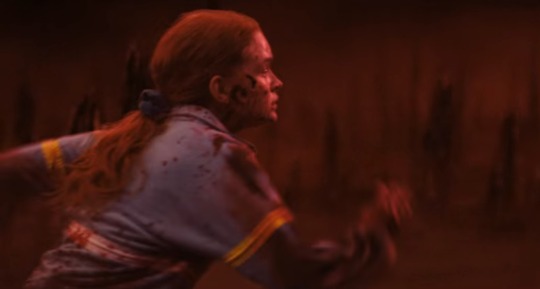
Willel's misfortune is that their powers are considerably more easily manifested than the average person's. Byler tells the story of visible vs invisible queerness, but that's just a reflection of the larger theme at play in the show: the visible and invisible ways kids are othered and abused.
Max's trauma was a quiet thing that came from within and festered until it was almost too late to save her... but Willel's trauma manifests as a giant monster that openly hunts them down.
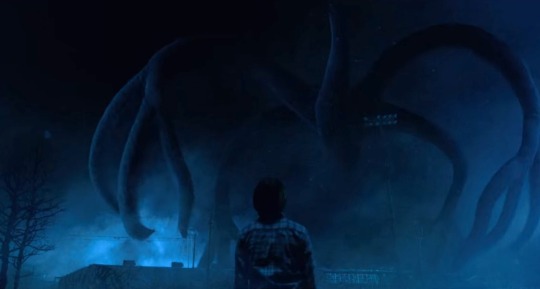
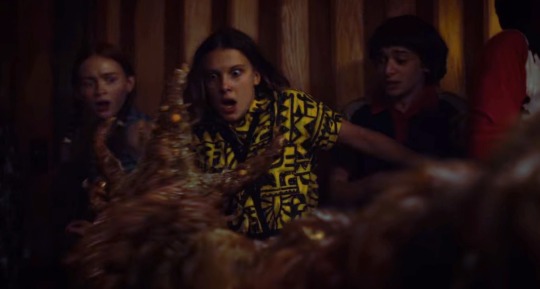
And I'm being literal when I say the Mind Flayer is a manifestation of their trauma.
We know that Vecna fashioned the Mind Flayer from a cloud of black particles he found in the Upside Down, but where did that cloud come from? The Upside Down is a mysterious enough place that it's easy to assume the Shadow is native to that realm... but what if it isn't?
The Mind Flayer is heavily associated with repression -- Will gradually lost his memories while he was possessed, and El lost her powers when the sliver of Flesh Flayer wormed its way into her leg.
But Will has mysteriously been without powers ever since leaving the Upside Down, and we've seen El lose memories too: her memories of surviving the lab massacre, in which she didn't simply escape by opening up a gate, but by disintegrating her attacker into black particles.
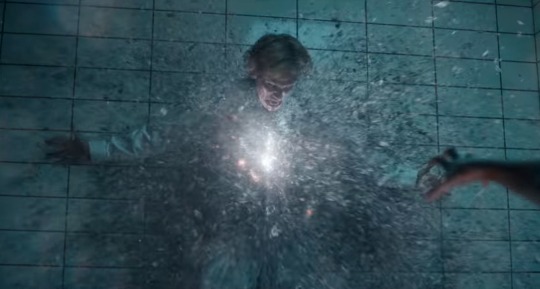
The Mind Flayer doesn't cause repression -- it is repression.
There must have been countless generations worth of traumatized children who took the extra step El did and sent their abusers -- or at least their memories of abuse -- into that hidden realm beyond the gate.
(There's also the possibility that Mr. Time-is-Just-a-Social-Construct is stuck in a time loop of some sort -- maybe the massacre has repeated hundreds of times, and Dimension X is a timeless graveyard of El's attempts to repress her trauma. This would explain why Henry seems to have both disintegrated and survived: we were watching at least two different iterations of the massacre all along.)
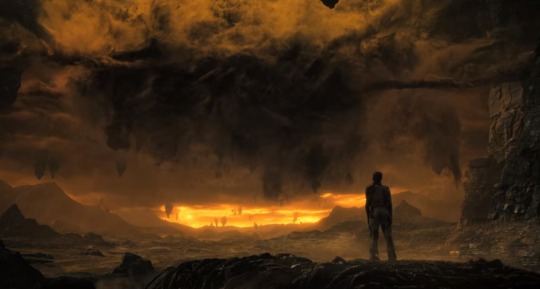
Whichever way you slice it, it's a perfect fit: the tool Vecna uses to perpetuate the cycle of abuse isn't some bizarro alien from an alternate dimension, but a direct consequence of the cycle itself.
The Mind Flayer tells us that escape alone doesn't work as a long-term solution: it might help you survive the initial abuse, but if you don't address the effect it had on you...
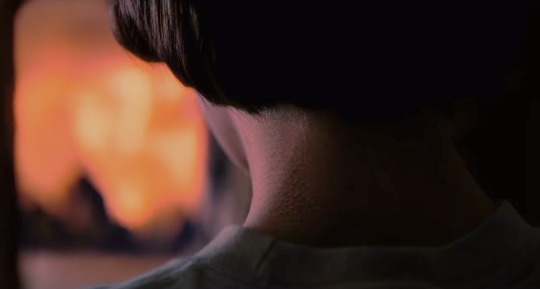
...it will come back to wreck havok.
[Edit: Click here for post-TFS thoughts on this theory]
#stranger things#will has powers#willel#byler#will byers#el hopper#max mayfield#barb holland#henry creel#mind flayer#my analysis
477 notes
·
View notes
Text
I remember a self-described queer feminist once very confidently telling me on here (in response to me saying star trek tos is racist of all things lol) that imperialism had not been theorised prior to like the 1960s so applying any kind of anti-imperial analysis to American television made prior to that time period was historically inappropriate. setting aside the base stupid logic of that for a moment it is immediately apparent that this statement is made with deliberate and profound ignorance to the many Black and Global South writers and activists who, in the 1930s, immediately diagnosed rising European fascism as the logical output of western imperialism. Langston Hughes said in 1937 “in America, Negroes do not have to be told what fascism is in action. We know. Its theories of Nordic supremacy and economic suppression have long been realities to us.”
#I should post about tos again it really helped cull all the annoying people who follow me#and they weren’t the only ones ofc. Lenin and so on and so forth
175 notes
·
View notes
Text
hi! happy season 8!!! or 11 if you go by broadcast
i made a list of all the programming bender scrolls past on their TV in episode 141:
Cosinefeld
Jupiter’s Next Top Model
Shatner’s Creek
Friends Reunion Reunion
The Steady-State Universe Theory
Unexplained Friday Night Lights
Mets vs. Godzilla
Next Week Yesterday
The [“A” in Alien Language 1]-Team
TruthBusters
Regular Ghost: Coast to Coast
Downton Crabby
Wide Wide World of Quarks
Star Trek: The Original Reboot
Disenpantment
The Mare of Neutropolis
Better Call Cthulhu
A Quiet Place: Live!
The Queen’s 8-bit
Plaid Programming
The Marvelous Mrs. Poopenmeyer
Buckminster Full House
Fonfon Ru Crashers
Stanley Tucci: Searching for Alderaan
The Sex Lives of Amazonian Women
π‘s Company
Melllvar Place
Alien vs. Predator vs. Bluey
Queer Eye for the Straight Line Segment
America Lacks Talent
Say No to the Overalls!
Married with Pupae
The Sims’ Sons
Infomercial: The Bowflexo
Fleaborg
Pimp My Hovercraft
Grey Alien’s Anatomy
The Botfather
Family Gorn
Will and Grkrk
0.999 [repeating] Full House
Sandcrab and Son
All in the Phylum
Look Who Glorbin’ 2
30 Rock from the Sun
American Holo Story
Back to the Present
M*A*T*H
The Best Dental Dam Show Period
CSI: Ceta Alpha Ⅴ
Just Disruptor Blast Me
News at √11
The Lego NewsHour
Rick & Morky
Everybody Loves Raygun
Halitos15
Blasterpiece Theatre
Frank Herbert’s Name That Dune
TCU Hypnotoads vs. Georgia Bullfrogs
Two and a Third Mutants
SporkCenter
Fargo But In Space
Quantum Nonlocal News
Smizmar Island
NYPD Ultraviolet
Yak Chat
Monday Night Rollerball
and the stuff that’s onscreen when fry is looking at fulu:
People Who Enjoy Mediocre Dramas Also Enjoy…
Slurm Dog Millionaire
Stranger Fonts
Smelly in Paris
Geiger King
The Clampmaid’s Tale
Things We Claim Are Trending
How I Met Your Smizmar
Only Murders in the Hoverdome
The Great Neptunian Bam-Off
The Scary Mirror
Humorbot 5.0 Stand-Up Special
Top Hits
Blob’s Burgers
Head Lasso
Real Housecats of Thuban 9
It’s Always Sunny on Mercury
Green-ish
#futurama#sorry for not including a clip or screenshots. i posted this less than 6 hours after the episode went live and#i did not want to risk invoking the wrath of hulu by sharing footage so quickly :')#00101110 01110100 01111000 01110100
217 notes
·
View notes
Text
Star Trek series rated by horniness (as rated by me, an asexual, so you know its objective):
Star Trek: The Original Series - what is there to say for the series that invented slashfic, fuck-or-die, and Thiess's theory of titillation in costuming? The universe is full of greased-up pecs and scantily clad women wondering what is this thing you call...love? It's easier to mention the episodes that *aren't* horny. 10/10, for how could it be otherwise?
Star Trek: The Animated Series - It's a Saturday morning cartoon series from the 70s, and yet... 3/10, for the surprising number of scantily clad muscular guys
Star Trek: The Next Generation - Oh, we *start* quite horny; Roddenberry is keen to let us know that the android has a penis in the second episode; but then Roddenberry dies, and by the final season even Troi is wearing a sensible duty uniform. 6/10 for Will Riker, though
Star Trek: Deep Space Nine - We've got Quark's, where the women are scantily clad, the holosuites are for fucking, and the waiters give themselves ear infections from doing too much oo-mox on themselves. We've got Jadzia Dax, who has three hundred years worth of sexcapades in two genders and will tell you about them at the drop of a hat. We've got Bashir and his sad blue balls for the first two seasons. We've got Klingons breaking each other's clavicles to initiate coitus. And we've got an enemy power led by the perpetual mind-melting gangbang that canonically is the Great Link. 9/10
Star Trek: Voyager - Weirdly conservative in its sexual politics. I mean, it goes out of its way to stick poor Jeri Ryan in that body condom, and there's a whole episode about space whales wanting to fuck the ship, and another one about Janeway wanting to fuck an Irishman, and *two* episodes about Pon Farr...actually, you know what? 6/10.
Star Trek: Enterprise - You know what, let me tell you about this series; this series is like a 14-year-old asexual boy boasting about his supposed sexual conquests in the hopes that it will endear him to the cool kids. It doesn't work; there's nothing genuine about it and everyone knows it; no matter how many innuendos he throws in, it's clear that there's no joy in it for him and he'd be happier if he could just go off and read comic books. Secretly, he wishes his friends still wanted to play with action figures. -1/10
Star Trek: Discovery - The show presents us with wall-to-wall gays who just...never seem to shtup each other. Like, I of all people know that sex doesn't define queerness, but...really? I guess maybe they're afraid of being less than wholesome? Anyways, 2/10 for that time that the Emperor went off to fuck a couple of Orions in the middle of a dangerous secret mission on the Klingon homeworld.
Star Trek: Picard - A series so sexless that it can't even show its main canonical couple enjoying each other's company for more than 5 seconds each season. And yet the chaste Jurati/Borg Queen pairing manages to be the hottest thing ever in the history of fiction. Anyway, I guess they technically had Agnes sleep with Rios in the first season, so 1/10.
Star Trek: Lower Decks - Oooh boy, we're at the heavy hitter now, my god. Completely, unashamedly horny. Gene Roddenberry *wishes* he could have done that orgy scene that people on Twitter were freaking out about. 11/10
Star Trek: Prodigy- They're *kids*. 0/10
Star Trek: Strange New Worlds - Not really a lot, surprisingly given their TOS pastiche. Still, we get some stuff with Spock. 3/10.
185 notes
·
View notes
Text


In 1968 the play The Boys in the Band was one of the first prominent pieces of American media to not just feature, but centre the stories of queer men.
It was initially difficult for write Mart Crowley to find a cast for the play, with Laurence Luckinbill (who would play Hank) warned that taking the role would end his career. But the production was such a success that it was adapted into a film in 1970. Now post-Stonewall, however, the lack of political angle to the film fell flat, and it wasn't a bit success.
The play was revived eventually for a Broadway production in 2018, with a cast of openly gay actors including Star Trek’s Zachary Quinto and Big Bang Theory’s Jim Parsons. The success of the revival led to a Netflix film adaptation with the same cast.
The Netflix version brought the story back into the public eye in an time when there are perhaps enough queer stories that there is perhaps more room for a small-scale, deeply personal story that offers a snapshot of another time, and drew from Crowley’s own life.
Learn more
[Images: 1970 and 2020 Boys in the Band posters]
#the boys in the band#boys in the band#queer history#queer film#queer plays#gay history#gay movies#lgbt#lgbtq#lgbt history#zachary quinto#jim parsons
185 notes
·
View notes
Text
Look, in some ways, A/B/O makes no sense, and particularly makes no sense in Star Trek.
In the first instance, the "Alpha Male" theory has been completely debunked. There aren't Alphas and Betas, there are parents and children. The wolf pack is family, and they love each other.
In Star Trek, if you want MPreg, there's magic, science, and transgender people.
Q could just snap his fingers and impregnate Picard. Hell, that sounds like something that could have been a canon TNG episode. Troi got magical-preggers. The Q need to repopulate after the war. Right?
You can 100% have Spock pregnant with Uhura's baby, if that's your ship. T4T is always an option.
Or in AOS in particular, because of the diminished number of Vulcans, maybe McCoy figures out a way to recombine Spock's DNA into fully Vulcan embryos, and then Kirk and McCoy carry them in temporary uteruses.
You want a fuck or die story where someone goes into heat? There's Pon Farr. It's the OG fuck or die.
You need knotting in your story, for some reason? Just make some stuff up about Vulcan D. Or have Odo use his shapeshifting to torment his little Ferengi boyfriend. Or maybe Julian Bashir has some weird augment features down there, IDK.
But in A/B/O lies the potential for the queerest stories ever told, because there are more dimensions of gender to be queer with.
Just decide that omegas can be gay for omegas, and the alphas can be gay for alphas. In a lot of ways, male/female is the secondary gender and has less to do with procreation than alpha/omega status.
Gimme a pair of sword-fighting lesbian omegas on the lamb from their oppressive alien government, and Kirk/Spock who are a bonded pair of gay alphas, commiserate with them. That sounds like quality content.
Or write a mutual pining story of Omega!Kirk and Omega!McCoy each of whom thinks they're the only one.
And what about intersex A/B/O, huh? Nature abhors monotony. What about a character who's physiologically an alpha, but has omega hormones? You could theoretically be double intersex in an A/B/O setting and I think that's great.
14 notes
·
View notes
Text

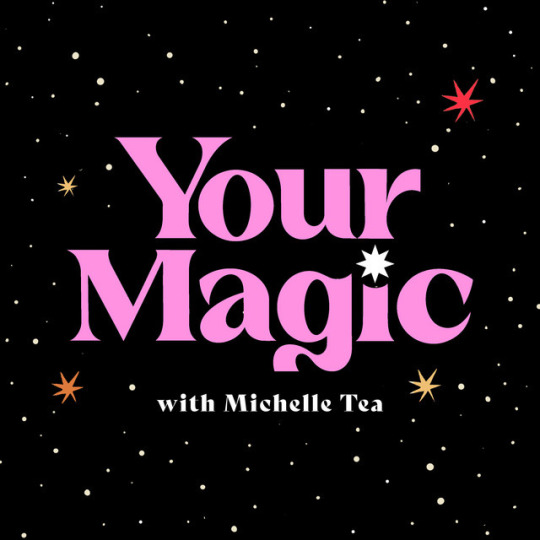

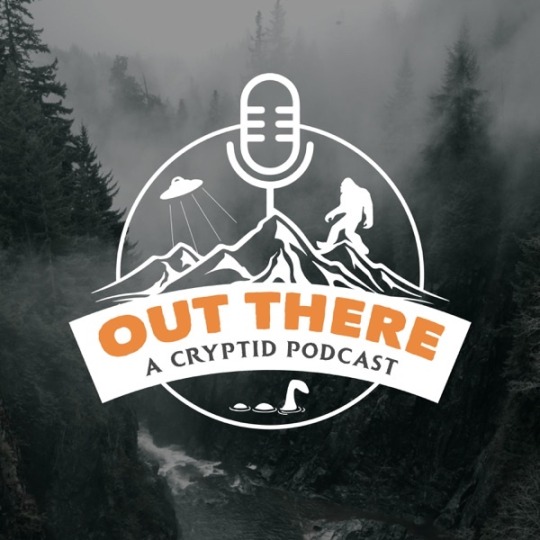


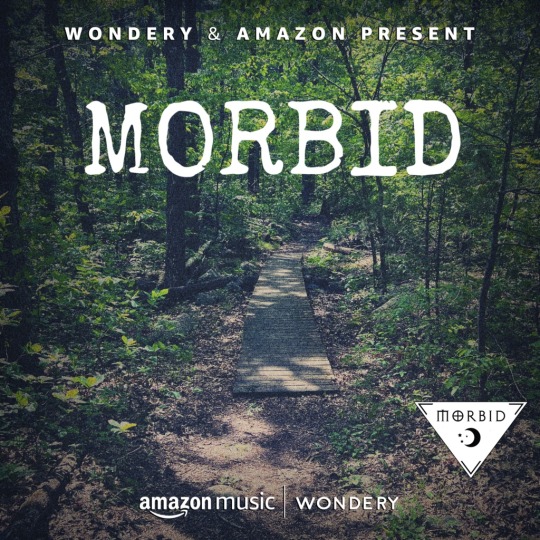



Nobody asked but these are some of my favorite podcasts!
I’ve gotten really into podcasts the past couple of years because of social isolation, my knitting addiction, and because they really help me get through tedious chores like folding laundry and washing dishes (this is honestly my favorite adhd hack, besides turning on instrumental fantasy music so I can focus when reading). So I’ve definitely cultivated a little mind garden of spooky, magical, and informative podcasts that I wanted to share with you. Some are more mainstream, some are a little more obscure, but all of them are dear to me and have comforted and nourished me during dark days.
National park after dark~ my current favorite podcast is hosted by two new englanders with backgrounds in conservation, animal care, and park exploration who share stories about dark happenings, mysterious sightings, perilous treks, and deadly experiences at national parks across the globe
Your magic~ an inclusive and open-minded modern magic podcast hosted by popular author, tarot fanatic, and lifelong witch Michelle Tea that features an amazing lineup of diverse guests including scientists, musicians, actors, social justice advocates, fledgling magic practitioners, and people who were practicing magic without even realizing it
Pleasing Terrors~ hosted by a former tour guide of haunted locations, this podcast explores morbid histories, creepy folktales, and unexplained circumstances from the perspective of a person who has devoted their life to researching and sharing ghost stories for over 20 years
Out There~ this queer host with a voice like melted butta tells dramatic tales about the encounters with, descriptions of, and theories about the cryptids that haunt our imaginations (the podcast used to include a weird club segment at the end where they would invite their hilarious friends to discuss the believability of the featured cryptid, but it’s been missing for a few months and I hope it comes back 🥺)
Lore~ most people are probably aware of this delightfully spooky podcast about frightening folklore, but I had to include it because this is one of my go-to podcasts for when I’m taking a nighttime bath by candlelight and need a good spooky story to soak to, because I’m a little weirdo like that
The Strange and unusual podcast~ intoxicating and beautifully-told macabre stories that range from dark fairytales, mysterious murders, tainted histories, and hand-woven tales crafted by the host herself (it’s accompanied by melancholic music and the occasional low budget sound effects of people grunting/dying lol)
Morbid~ my emotional support murder podcast 😭😹. I was never really one to follow true crime, but I discovered this popular podcast when researching the haunted past of lake Lanier and I fell in love with these girls and their wonderful storytelling, hilarious banter, and thoughtful perspectives. Plus, getting extra insight from Alaina’s autopsy background is fascinating to me. And who doesn’t love the delightful nonsense and off-the-cuff witticisms that spout from Ash.
Cults~ this is the podcast that got me into daily listening! I was a big fan of welcome to night vale since the beginning, but Cults is the podcast that truly got me hooked on podcast listening and I even fall asleep to it (I guess listening to horrifying stories about mass manipulation is… soothing? Am I okay?). The podcast has unfortunately been on a year long hiatus but it has an ton of archived episodes that will thrill and chill you. Now I guess I need to start a new cult so they can have more content 🤔🤫
Coffee & Cauldrons~ this podcast is hosted by two professional tarot readers with mentoring personalities who want to make the world of magic accessible to everyone. Their show includes book recommendations for beginners, insights on how to practice during different lunar phases, tips on creating your own altar, and stories about their personal practice.
Spooked~ the latest podcast I’ve added to my very long list is hosted by a black creator who shares ghost stories from the first-person perspective. I really like this podcast because it’s produced by a team of people who are very diverse in race, age, gender, location, and background, and the guests they feature on the podcast to tell their own stories are just as varied.
If you made it to the end, thank ya and love ya! Happy spooking! 💜🌸👻
46 notes
·
View notes
Text
Is Sarek abusive?
After a lengthy argument/discussion with my mother (og Trekkie, strangely unfamiliar with K/S culture), I seem to be at a stalemate. It's fascinating because there's a lot of points on both sides. I'll provide my own argument and my mother's argument under read more.
Mine:
-Sarek's behavior (and by proxy, many Vulcans) towards Spock's mixed genetics is a direct contradiction to IDIC (Infinite Diversity in Infinite Combinations) as Spock represents a small portion of that ideal: Mixed race, arguably queer, and neurodivergent.
-In the Star Trek 2009 deleted scene, Sarek calls him "so human," and from some theories it's believed Spock was surgically altered to appear more Vulcan
-Arguably, you could say this was so other Vulcans wouldn't bully him for looking so human, but we already know how that went.
-Amanda is passive in her parenting, and does little to engage Spock in human traditions along with Vulcan. She goes along with Sarek's beliefs, even if it hurts him.
-Sybok was exiled(?) for embracing emotion and encouraging others to do the same. Michael ran away and is a complete emotional mess (but probably the best out of the three). Spock has identity issues. See a pattern?
-Tuvok is seen to embody a healthier ideal of Vulcan: Permitting himself positive emotions, because it is illogical to deny himself of that. You could imply Sarek's family is just very dysfunctional.
-You can only go so far when excusing behavior with culture, but if someone is being hurt or caused harm, however indirect, it must be addressed by the society or a third perspective in order to improve.
Mom:
-everyone is abusive by modern standards / by human standards, everyone's abusive
-Sarek is an extreme outlier for marrying a human
-Most surgical procedures for Spock make sense, because they'd have to fix some conflicting issues (iron-blood/copper-blood, organ arrangement, etc.) but it is sad Sarek thought to change Spock's appearance when it didn't hinder him in any way.
-By Vulcan standards, Sarek isn't abusive because if anything he's less strict than other Vulcan parents.
-Sarek wasn't considered abusive when the show aired, and he isn't considered abusive now.
-You can't judge another culture by your own standards. (Side note: also believes you can't judge the cult in MidSommar for drugging someone, along with other things they did because it's "their culture.")
With all this in mind, I'm curious to know the general consensus around this topic. I'll leave some extra context below:
My mother comes from an extremely abusive family. Jack Stauber's Opal-level abusive. (I showed her the film and she cried with me) As such, it's understandable that we might have different definitions of abuse, given the generational difference (she's an older mom) and cultural difference (she's Mexican).
Because of this, I'm a pretty sheltered kid, but that also means I don't have a lot of exposure to difficult situations or significant abuse. I can acknowledge that I still have a lot to learn, and I'm trying to peel off my black-and-white mentality as well. I'd appreciate any feedback relating to this and the poll above so I can revise my perspective if I'm wrong!
#fuzzy gushes#star trek#spock#s'chn t'gai spock#s'chn t'gai family#sarek#amanda grayson#vulcan#vulcan culture#vulcan biology#The Romulan Way#Star Trek 2009
48 notes
·
View notes
Text
Author Spotlight: Louisa Vidal
Starting out November strong with a guest post from Louisa Vidal, author of club read Trash Planet Confidential! Read on to see why Vidal appreciates genre fiction.

The Joys of Getting Goofy with Genre
Genre fiction can be easily dismissed by those immune to its charms. But any fan knows that it’s often a method used to examine the biggest issues in the world and find a fresh angle on them. Science fiction itself has an impossibly rich canon of visionaries like Octavia Butler, Ursula K. le Guin, Anna Kavan, and Nicola Griffith, here to shock, educate, and inspire us. It can also be an excuse for intense silliness: make pretty girls green, stick a rubber mask on a dog and make it an alien, go for a joy ride in an asteroid shower.
When I got the prompt from Space Fruit Press that their 2023 queer romance anthology was going to be sci-fi themed, I’d like to tell you I immediately sprung into researching astrophysics and extra-terrestrial biology. Being well-read in the sciences is hot, right? But while I don’t mind a dilly-dally with quantum theory now and then, I knew what I really wanted to write about: Space Lawyers.
In the Venn diagram of my love of science fiction and legal dramas, the overlap is the procedural stuff. This is the backbone of Star Trek - the detail of people just doing their jobs, or trying to, while their colleagues drive them crazy by letting tribbles on board or ripping open a portal into another dimension. This is not a million light years away from the crime TV and film (I’m old enough to have lived through the John Grisham adaptation era), where the storyline may have involved murder, corruption, or the Mafia, - the core of the action is also workplace drama.
For my story, Trash Planet Confidential, I made a stack of my favourite legal eagle tropes - class differences, enemies joining together for a noble cause, archive-digging - then stuck them on a rocket and propelled them into outer space. The world-building came easy once I knew I was writing about main characters from very different socio-economic backgrounds, who were also both ambitious lawyers; that one of them was also bright green was a pleasing aesthetic addition, and making her politically powerful was a reclamation of the Sexy Green Alien Space Slave cliché.
As a reader of queer romance, I glory in the subversive power of a happy ending. In science fiction, the world the creator shapes is only lightly bound by the laws of physics, and in the fantasy of legal dramas, lawyers can fight on the side of good and win. For all that quantum physics can provide solace, so too can lesbian sex scenes. Having the freedom to have fun is a part of romance that queer women and femmes deserve, too.
- Louisa Vidal (Goodreads)
Trash Planet Confidential
21 notes
·
View notes
Note
I recently read that Risa from Star Trek was originally going to be shown as explicitly LGBT-friendly thanks to Gene Roddenberry but that Rick Berman told the person in charge of designing Risa to ignore the note where he had asked for same-gender couples to be shown. Memory Alpha's Article on Risa says that Roddenberry had wanted to "radically change Risa's culture to incorporate extremely graphic depictions of homosexual behavior" (which to me reads a bit confusing and a bit like a homophobe wrote that because I doubt that Roddenberry wanted to show gay couples explicitly fucking on-screen with their genitals visible or a close-up of two guys making out with the camera zooming in on their tongues lol - but I may also have taken the phrasing of "extremely graphic depictions of homosexual behavior" in bad faith tbh though I kinda doubt it), and I haven't looked for the documentary where that is said yet but am a bit sad because that would have probably been quite nice, considering it's supposed to be a planet whose inhabitants are sexually open and which is known as a pleasure planet. I know canonical Trek has become more open to depicting the existence of queer people in actual text (or on-screen) rather than just subtext, which is very neat, but realizing that could have been incorporated more obviously in TNG or almost was done does make me a bit sad.
I have heard/read multiple times of people trying to include stuff that's more openly queer and queer-friendly and then being shut down because of either people in charge being scared of censors and homophobic viewers boycotting Trek or getting the show(s) to be shut down or people in charge themselves being homophobic. That sucks.
This paragraph was mostly me rambling about Barclay (am Data/Barclay anon from a while ago ehehe) because in one Voyager scene Barclay is shown being served drinks by a twink with a rather prominent bulge on Risa but then I decided not to bore you to death with my delusional ramblings about that being an indication of Barclay being bi due to him first interacting with another guy in a scene that starts with panning over a Risian beach where mostly straight couples are shown interacting with each other, as well as one throuple (two ladies, one guy) and a lonely woman getting up from the sand.
Sorry for rambling again. Also sorry if I have sent an ask like this (as in talking about Barclay in that Voyager scene on Risa) a while back, my memory is quite bad.
--
Hi, just sent in a long-winded ask about queer representation in Trek and specifically talking about Risa, and rambling about Barclay... I just realized the "lonely" woman getting up wasn't actually lonely, but that I managed to overlook that she had been on the chair next to and conversing with another lady. I was too distracted by the waiter alien's bulge lol. So either they're a couple too or my silly grasping-at-straws-pseudo-theory is indeed bullshit. Still wanted to clarify for accuracy.^^
14 notes
·
View notes
Text

Guest Column: Queer Ecology
Author(s): TIMOTHY MORTON
Queer Ecology: 'Frankensteinian meme splice' between ecological criticism and queer theory. Foundations--ecology and queer theory both demand intimacies with other beings.
"Our era requires it--we are losing touch with a fantasy Nature (capitalized to emphasize that it is less natural than nature) that never really existed" while we are losing the very real life forms in Earth's sixth mass extinction event…
Judith Butler identified how heterosexist gender performance produces the binary--inside//outside. Ideologies of Nature , are founded on inside-outside structures that resemble the boundaries heterosexism polices
when the environment becomes intimate--as in our current age of ecological crisis--it is no longer an environment since it no longer just happens around us; this is the difference between weather and climate.
society once defined itself by excluding dirt, germs, pollution but this is impossible--we must know where our waste goes.
"excluding pollution is part of performing Nature as pristine, wild, immediate and pure" (274)
'science is too important to be left to scientists.'
nonessentialism- Darwin; evolution=lifeforms made of other lifeforms
deconstruction--no text or lifeform is one 100% 'authentic'
'queer theory and ecology supposed a multiplication of differences at as many levels and on as many scales as possible' 275 (reminds me of infinite diversity in infinite combinations...star trek)
'life is catastrophic, monstrous, non holistic, and dislocated, not organic, coherent, or authoritative'
'life-forms are liquid; positing them as separate is like putting a stick in a river and saying, 'this is river stage x' (reminds me of mni wiconi-water is life)
life forms constitute a mesh--that blurs all boundaries between species, living/nonliving, organisms and environment.
gender diversity and biodiversity are deeply intertwined. plants and animals are hermaphroditic before they are bisexual and are bisexual before they are heterosexual. males and females of most plants and half the animals can become hermaphrodites either together or in turn, and hermaphrodites can become male or female; many switch gender constantly.
the story of evolution is a story of diverse lifeforms cooperating with one another.
evolutionary satisficing--if your body kind of works, you can keep it. gender and DNA are both performative.
speciesism- underlied with sexism, racism and homophobia
any attempt at queer ecology must imagine ways of doing justice to life-forms while respecting the lesson of evolutionary biology--that the boundary between life and nonlife is thick and full of paradoxical entities. 276
the life//nonlife binary--there isn't a rigid, narrow boundary between the two. if a virus is alive, a devil's advocate might claim, so is a computer virus.
queer ecology might abandon the term 'animal' and adopt something like 'strange stranger' (arrivant)--irreducible, whose arrival cannot be predicted or accounted for (hospitality).
instead of reducing everything to sameness, ecological interdependence multiplies differences everywhere. unmysterious and miraculous. interdependence--it is the reason life exists at all
queer ecology questions the human//nonhuman binary.
queer ecology--go the end and show how beings exist precisely because they are nothing but relationality, deep down--for the love of matter.
every life form is familiar because we are related to it. we share DNA, cell structure, subroutines in the brain.
collectivity--consciously choosing coexistence
we shall achieve a radical ecological politics only by facing the difficulty of the strange stranger. (we have others--rather, others have us--literally under our skin (clark))
Against Compulsory Nature
to solve our environmental problem (like global warming) we should be working with intimacy.
darwin; the engine of sexual selection is sexual display. appearances and behaviors. sexuality=sheer aesthetic display
environmentalism-tries to rise above sexuality. Loving Nature becomes enslaved to masculine heteronormativity. a performance that erases the trace of performance--"leave no trace". masculinity is 'Natural'-'Natural' is Masculine. rugged, bleak, masculine Nature defined through contrasts; outdoorsy and extraverted, heterosexual, able-bodied. aggressively healthy, hostile to self-absorption. Not feminine, no room for irony or ambiguity, nonhumorus. Masculine Nature is afraid of its own shadow, afraid of subjectivity
Organicism wants Nature untouched, 'virgin', established by exclusion, then the exclusion of exclusion. Naturalized. queer ecology--interconnectedness is not organic. mythical Nature dissolves when we look directly at it.
'dark ecology'--zombie-like quality of interconnected lifeforms, keeps going and going and going like the undead
Frankenstein--queer ecological ethics might regard beings as people even when they aren't people.
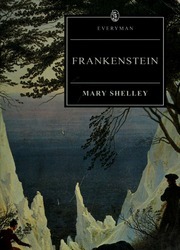
vegetarian (vegan) rhetoric often obsessed with obsession, equating madness with crime, crime with disease: longing for a society without a trace--a society without people
Into the Wild novel--fatal experimentation with masculine Nature, realizes other people are important just before dying from a poisoness plant. he was not in as remote a location as he believed. his concept of wilderness overrode his survival instinct. they might think they are escaping civilization and its discontents but they actually act out its death instincts.
fantasize control and order; "i can make it on my own"--myth of self made man, editing out love, warmth, vulnerability and ambiguity.
Queer ecology must visualize the unbeautiful, the uncold, the 'lame', the unsplendid
joy as coexistance with coexistance
ecology and queer theory are intimate. its not that ecological thinking would benefit from an injection of queer theory from the outside. it's that, fully and properly, ecology is queer theory and queer theory is ecology: queer ecology.
#Guest Column: Queer Ecology#queer ecology#ecofeminism#queer theory#critical ecology#ecology#dark ecology#nature#environmental politics#heteronormativity#queer history#erotophobia#evolution#masculinity
7 notes
·
View notes
Text
The Lie: You can only make a story around character or events nothing else~~
USian Lit professors ruining writers again and World Lit with it. This isn’t one of those posts where I say, “If you start with character or events you’re wrong.” It’s about my core philosophy OPTIONS~~~ Options. The ones that everyone railed against after the 20th century and people turn their noses up at because, ya know, questioning status quo as PoCs, Women, queer people, disabled people–i.e. the majority of the writers and readers when you put the market together, yet somehow the publishing industry doesn’t want to cater to us... were told flat out if we do it, we’re being snobby, Literary, or Ohhh... insurrectionists. (Or whatever, mostly called “inferior”) And if you don’t believe me, go read Robert Scholes’ writing book where he thinks that only white straight men can write... (OK, maybe I’ve read too many of these bozos.)
My exact problem is being told we’re wrong for doing it another way. And that this way is too snobby, when it’s probably one of the oldest methods in the history of literature. So strap in, let’s get into it.
I get it, some people are going to act like victims at this point and say are you saying that it’s wrong? Or even, what do you mean this method was invented by a bunch of prejudiced white men who often tried to take credit from less privileged people? I cover that in the other series of posts so you a see how we got here (and I warn you I found it super depressing. Especially slapped with blatant racism, sexism, anti-queerness, etc.)
What I think is you can accept the origin story of where “It’s either events or character” comes from (Great Man Theory, BTW, which is imperialistic), delve and QUESTION it heavily, and then challenge the origin more deeply by thinking about it critically and how you would like to overcome that and make their story.
Questioning what’s handed to you critically is the whole point of the Worldbuilding and Worldwide Story Structures post. Doesn’t say it is wrong. It just gives you more options to think about and engage in.
Morals
Honestly, when it has the answers and is reinforcing the status quo, rather than questioning it, it is often boring.
Pros: It engages directly one of the two tenants (when done well), Makes people think. The secondary is then makes them feel.
Cons: When done badly, it can feel preachy, rather than introspective. And people often hate their morals being questioned so may refuse to engage. It’s also prone to getting banned.
Authors who stated they use this:
Ursula Le Guin (Who gets hated by Structuralists)
Toni Morrison (Who said so on Charlie Rose--why would you think it’s conflict?)
Star Trek... most of it.
Some of the early writers of Star Wars.
A lot of Sci-fi writers including Octavia Butler.
A Tree with Deep Roots (K-drama) also engages in this.
As a secondary, Outlander often asks questions about Morality (Diana Gabaldon)
Making a story around this would look like finding a central moral question and then breaking that moral question into parts and then finding characters and events to address those parts.
You start from the widest point down and deliberately make it so.
Ways to Live
More common with Indigenous Peoples of N&C&S Americas, not all tribes/nations of course. And particularly with Plains tribes such as Zuni. Also common to Aboriginal people. A tad bit to some Polynesians, and parts of Africa (scattered)
Pros: When done well it makes you ponder on it for days, because often there is a central value, which is not a moral, and you’re turning it over in your head over and over again.
Cons: You have to craft the story very, very carefully, and it may take some time before you get it to land just right. This may not go over well for people who improvise their writing. Because when the story is well put together it suddenly has this clicking feel to it which is difficult to achieve.
Also kinda better for shorter stories (or I’ve never seen it done in novels yet--if you have one, drop it in the comments please~~) and made up folktales...
Themes
Thematic plotting is where you take a central theme and then kind of snowflake it out from that, similar to morality plotting. Often thematic plotting and morality plotting has overlap, meaning they often are done together.
But a theme can be anything like fairies, divorce, marriage, disability, etc. And then you’d break it down for each of the parts and figure out how to represent that through character and events.
So, let’s say your central theme is disability. You might break off Neurodiversity and put that to the side and ask if it is a disability. Then you might want to find someone to represent that and the views about it.
You might also then take someone who is a wheelchair user and then decide you need a character for that.
But you also may want someone who is in a walker.
Then you might decide that you need someone who is disabled, but doesn’t “look” disabled.
Then you might think about what does disability mean for each of them and how are you going to address disability rights in your story. So say the Neurodiverse person you’ve made has Sensory Processing Disorder. You might ask, “Is this really a disability?” And about ableism and disablism. From that, you might formulate an event to demonstrate this.
You can also do it from events. So for example, you think that a disability rights rally about X issue is needed to show the different views. But overall, it always loops back to the theme.
Pros: Engages the reader to think, primarily. Feel is kind of second on the list, if the theme is teased out well and focused. Generally the ones that do well are philosophical and delve deeper on an idea. Say motherhood. What does it mean to be a parent. Something with an endless well to talk about that interests the author. I love theme babies and when done well it can do things like make you cry over a damned potato. Or even rocks on a cliff. Damn you both. I’m tearing up thinking about it. WHY!? Why am I crying about rocks with googly eyes with text on the screen?
Cons: Themes that don’t grow beyond the base idea often feel stagnant. It’s better to let your themes evolve over the course of the story. If you choose a theme you don’t have a lot of ideas on it can feel too sparse. And if you over pack it without any kind of organization, it can feel chaotic, rather than organized.
Generally people who use milestones--or set out event points in the road do better with this one. Pure improvisers tend to dislike this, though it can work if you’re sure you can hit the points in an organized fashion.
Authors:
Divorce Testimony by Na Hyeseok (Theme is divorce and marriage, and a memoir)
Hong Sisters (especially Greatest Love. Crying over a potato...)
Everything Everywhere All at Once (Primarily theme first, then tone).
Tone
I have to say Japan does it best... but I’ve also seen tonal theming from Indigenous peoples, Magic Realism, as a secondary on other East Asian drama regions, in Horror, as a secondary in some African Lit and West Asian Lit. It is really difficult to nail if you start with character+event. And honestly USians, in particular, have a really hard time nailing tone, in general.
Pros: Emotions come first and hits you directly in the feels first, which might make you reel in your head for quite a while. It’s much, much harder to guess plot points from the outside looking in. The bubble effect I refer to often in Japanese dramas which makes me envious is much easier to achieve. Because tone takes a while to develop over the course of the story, guessing ahead becomes near to impossible. You don’t know what the final effect will be until it hits you square between the eyes. And then the emotions are overloaded, when done well.
Cons: Tone takes a while to develop. It often dies a quiet death because of the whole “I NEED EVERYTHING ON PAGE ONE” mentality from US pressuring other regions to do the same. It does not work well with impatient people. Also, it takes a high amount of skill to do well, and usually command of tone on all levels is a last, not first skill for writers of all regions. Hitting people in the feels the same way across the board is HARD. Really hard, which is often why it’s paired with thematic and moral plotting.
Authors:
Natsume Soseki Botchan is a master class in this.
(Central Story driver)
Sometimes, some regions just go by the central story driver which then dictates the rest of the events and character. Honestly, I think conflict is probably the worst for this because people don’t generally love it. Conflict is not on the list of things that makes things go viral. People LOVE cooperation, for example. But often people will go by a central tenant of the story driver and choose from there.
Absurdists might think about ways to subvert the conflict to make a joke.
Other methods
For example, Diana Gabaldon takes pieces from her research, makes a scene from it, and then writes characters around it, and then slowly stitches it together. She started out originally with character, however, the bulk of her writing, according to her is done through research then write method. The downside of this is huge word count since integration is not the first concern.
Some people start with interesting subjects they’ve found such as Guy Gaviriel Kay. He starts with research, then works on integration.
Similarly, Ordinary People by Judith Guest was started from a newspaper clipping.
Some authors start with a sharp image, rather than event or character.
Some authors start with setting. Since there are so many parts to “What makes a story” theoretically you can start with any of them. The only thing I would think you really have to think over is how will it hang together.
The point is, while starting with character or event is not wrong, finding other methods to plot might make your story stronger depending on how you command the tools. And let’s not forget that writing is a craft, so why not utilize as much of the toolbox as possible?
29 notes
·
View notes
Text
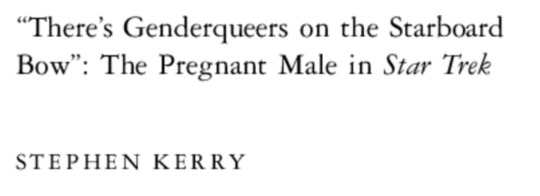
just so you know im like regularly saying 'there's genderqueers on the starboard bow' in reference to this queer theory star trek article i stumbled on like three years ago
#havent read it because i dont care i just loveee the title#me trying to come up with a title quote if im honest
8 notes
·
View notes